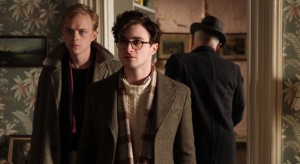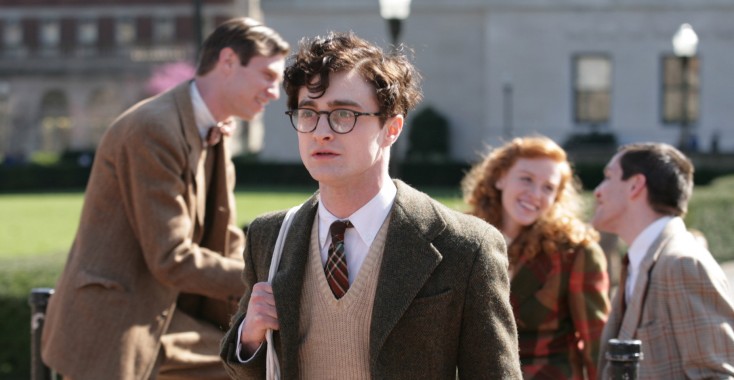
Left to right: Dane DeHaan as Lucien Carr and Daniel Radcliffe as Allen Ginsberg in “Kill Your Darlings.” ©Sony Pictures Classics.
By ANGELA DAWSON
Front Row Features
HOLLYWOOD—Daniel Radcliffe plays a student in his new film in “Kill Your Darlings,” but it’s a role as far away from Harry Potter as you can imagine.
Radcliffe portrays Allen Ginsberg, the famous Beat poet whose “Howl” has influenced and inspired generations of readers.
“Kill Your Darlings,” tells of the story of the poet as a wide-eyed young man who arrives at Columbia University in the early 1940s and discovers a portal to art, intellect, culture and freedom via a group of friends with modern ideas and attitudes. Among them is Lucien Carr (Dane DeHaan), a handsome blond rebel who becomes Ginsburg’s object of fascination.
Allen soon is drawn into Lucien’s hard-drinking, reefer-smoking, jazz-clubbing circle of friends, including William Burroughs (Ben Foster) and David Kammerer (Michael C. Hall), an older hanger-on who resents Ginsberg’s position as Lucien’s new sidekick. Carr is full of grandiose manifestos but it’s Ginsberg who produces the work that will set the world on fire.
While Ginsberg and Kammerer compete for his attention, Carr is drawn to Jack Kerouac (Jack Huston), who’s older, tougher, cockier and heterosexual, but instead of competing with Ginsburg, he encourages him to expand his poetry writing. This so-called “Libertine Circle” comes undone when Kammerer finally musters the courage to express his desire for Carr, and winds up dead.
Arrested on suspicion of murder, Carr begs Ginsberg to help him write his deposition statement, and Ginsberg has to decide whether to lie to the district attorney and support his friend’s innocence or tell the truth and condemn him.
The 24-year-old Brit already has established himself post-“Potter,” the eight-part film series based on J.K. Rowling’s bestselling fantasy books, with turns on Broadway, including the lead in the musical “How to Succeed in Business Without Really Trying,” and a few film roles including “The Woman in Black” and “December Boys.”
Surprisingly down to earth despite his megastar status, Radcliffe reveals that the idea of playing a bespectacled Jewish kid from New Jersey seemed a little far-fetched to him initially, but he loves a challenge and was eager to get into the skin of the renowned poet.
Appearing lean and fit for an interview, Radcliffe says he got into the 1940s mood—the era in which “Kill Your Darlings” is set—by listening to music of the period throughout production, even while off set. One of his favorite singers during shooting was honey-throated songstress Jo Stafford. Radcliffe says playing the poet, who was gay, was one of biggest challenges of his career and also one of the most personally rewarding.
Q: What was your favorite among Jo Stafford’s songs?
Radcliffe: “No Other Love” is really one of the most heart-wrenching songs. It’s so beautiful and her voice really makes it. In somebody else’s hands, it wouldn’t be nearly as emotional. There’s something about her delivery of it and the way her voice is. It’s at the fringes of what a voice can do. It feels like emotion cracking from it. It’s always fun making a playlist for a film.
Q: I was dubious at first about you playing Ginsberg before I saw this film.
Radcliffe: I’m glad you kept an open mind.
Q: Did you wonder if you could pull it off?
Radcliffe: When I read the script, I associated with him a lot. I understood a lot about him and his kind of mentality. There are aesthetic hurdles to get over, in terms of hair, eyes, all that stuff. All of that stuff is really important and we have to look at it. The reason I didn’t worry because at the core of the character was somebody I understood, or felt like I understood and could play. It’s partially due to his love of poetry. It’s partially due to the fact that he has this rich inner life, which he isn’t always articulate enough to say what’s going on, when he was a younger man. The difference between this incredible confidence in his intellect and socially reserved, slightly shy guy was really interesting to me. Of course I thought, “Can I pull this off?” But once we started filming and got into it, and saw myself looking like a young Allen Ginsberg, it seemed a lot less of a stretch.
Q: This is among your best performances on film.
Radcliffe: Thank you. I agree this is my best work on film—100 percent.
Q: Were you familiar with the Beat writers?
Radcliffe: Oh yeah. I knew about them. Basically, I’d read the most famous thing from each of them. I’d read (Burroughs’) “Naked Lunch,” (Kerouac’s) “On the Road” and (Ginsberg’s) “Howl.” But I hadn’t gotten too much farther than that. I’d read about Burroughs’ life because that is fascinating as well. So it was really a journey of discovering their poetry as well as their personal lives. The most exciting thing about making this film was telling the story about the relationships between these guys.
Q: What has your journey been like from the past five years?
Radcliffe: Since finishing “Potter,” there’s been a huge journey for me. I’ve never really worked with different crews before and with different groups of actors before. If you’ve done a “Harry Potter” film, you’re never going to work again in England without knowing someone who was on that crew. So doing “Kill Your Darlings” (in the U.S.) was a huge thing for me because it meant I would be working with nobody I knew and I would have to find out who I was on a film set again. It felt like I was starting fresh, in a way. But that was really exciting. Working with John Krokidas (the director and co-writer), he introduced me to techniques and ways of working that I’d never been shown before. I don’t know from what point exactly, but I think from doing “How to Succeed in Business” through “Kill Your Darlings” was a great period of transition for me in the way I work.
Q: The beat poets and generation have such a staying power, they’ve been around for 50-plus years. When you were a teenager, did you have some angsty writing that you put down that either reflected those feelings, and why do you think the Beat writers remain so influential today?
Radcliffe: I definitely have my fair share of some really bad poetry that I wrote when I was 17 or 18. In terms of the Beats, there’s something about they way they did what they did. As somebody who grew up outside the States, they weren’t as much a factor. The thing I compare them to and I used for my point of connection, is the punk movement between ’75 and ’79, because that had the same kind of excited nihilism about tearing everything up and starting again. There’s something really thrilling about that. It says something that really applies to the Beats that there are two types of poets. There are people who write poetically about their lives and there are people who live poetically and write about it. There’s a wild abandon that goes along that even if you don’t get every reference to their work, you can get swept up in the rhythm and excitement of it.
Q: You’ve published a book of poems, right?
Radcliffe: Yes, I did. I had the stupidity to have them published under a fake name when I was like 17. So, yeah, they’re out there. They’re not actually particularly angsty ones, thankfully, if I remember correctly. Don’t look them up. I know it’s pointless saying that now. (He laughs.)
Q: Did the glasses help you get into the Ginsberg character?
Radcliffe: Not so much as the (brown) contact lenses. That made a huge difference. You look at yourself in the mirror and you don’t look like yourself. That makes you confidant is asserting a slightly different physicality and accent and then everything starts to fall into place.
Q: Did you stop exercising before you made this because you look very fit right now?
Radcliffe: I wasn’t when I made the film. I was actually skinnier than I am now. I probably weighed less than I do now. Before I did “Horns,” the director said to me, “You should go to the gym because you have to convincingly look like you could deliver a punch.” So that might have had an effect or something. I remember thinking when I was making (“Kill Your Darlings”), “I’m getting into pretty good shape,” and then I saw it and said, “Oh, you’re just skin and bones.” So it was after that that I started going to the gym.
Q: Did you finish filming “Horns?”
Radcliffe: Oh yeah. We finished that in December of last year.
Q: Is that coming out in 2014?
Radcliffe: Hopefully. It doesn’t have a release date yet. “The F Word,” the film I did with Zoe Kazan, will hopefully be in the early half of next year. We don’t know exactly when yet.
Q: Were you hesitant to do a romantic comedy because we know how it’s going to end most of the time?
Radcliffe: Yes, but I think our film succeeds for a few reasons that a lot of others don’t. In this situation, I fall in love with Zoe’s character. Zoe has a boyfriend played by Ralph Spall. Ralph is actually one of the things that makes the film work most, because he’s not an *******. He’s not the bad boyfriend who you want her to leave so she has a genuine dilemma. She has a lovely boyfriend who loves her and whom she loves but she just can’t deny she is having very complicated feelings for a friend. Look, we’re not reinventing the genre with this film at all but I think we’re a really good example of how good the genre can be. It’s smart and the relationships feel smart.
Q: I know you’re a “Simpsons” fan and you’ve voiced a character on the TV series. They announced they’re going to kill off a character this season. What’s your prediction?
Radcliffe: If it makes any logical sense, it would be Grandpa.
Q: How about Mr. Burns?
Radcliffe: No, Burns can’t die. It may be Comic Book Guy from a heart attack. When you’ve got 400 episodes, or whatever it is that they’ve done at this point, there are a number of people you could call essential characters.
Q: I’m sure it won’t be Homer.
Radcliffe: It had better not be! I did a voice in the season that’s about to air in an episode called “Digs.”





